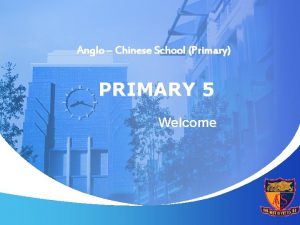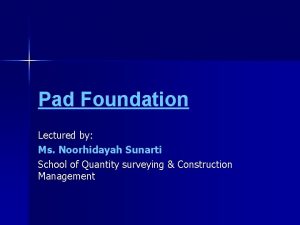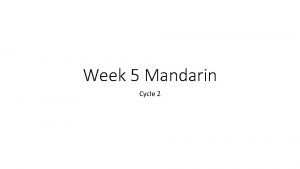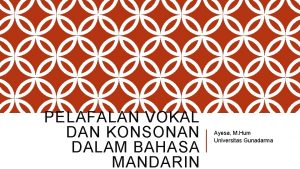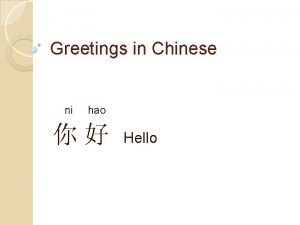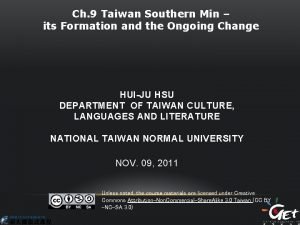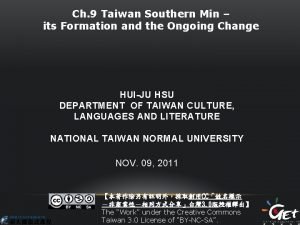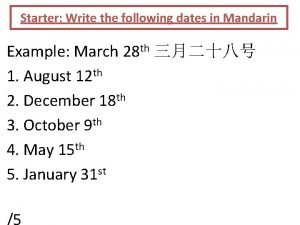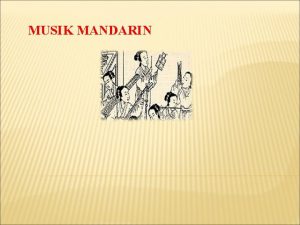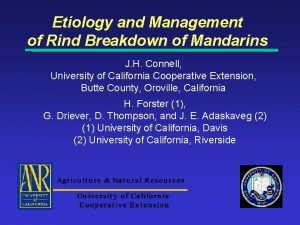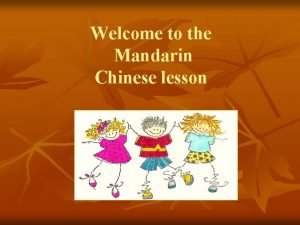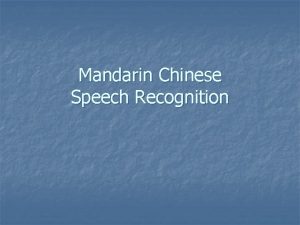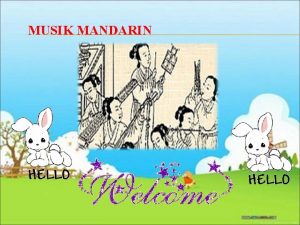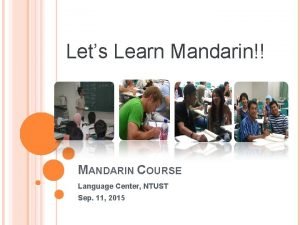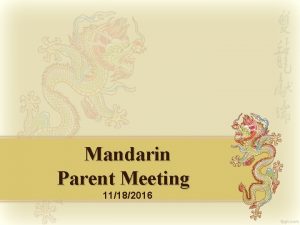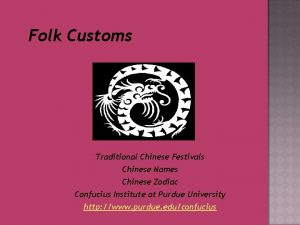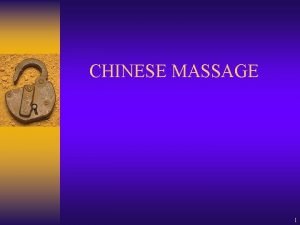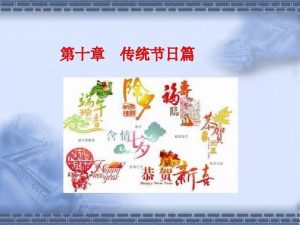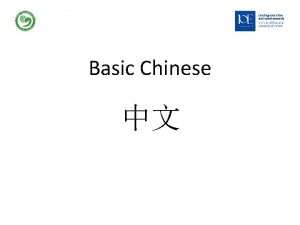FOUNDATION CERTIFICATE OF SECONDARY EDUCATION in Chinese Mandarin


















- Slides: 18

FOUNDATION CERTIFICATE OF SECONDARY EDUCATION in Chinese (Mandarin) Anne Martin & Alice Webb 18/06/2016 Version 3. 0

Case Study Lucy Gu is Head of Mandarin at The Dixie Grammar School in Market Bosworth. She switched to FCSE in 2013/14 following the withdrawal of Asset Languages. • We have managed well so far and find FCSE easy to understand use. • The FCSE course has motivated our students to try their best to achieve their full potential. • The resources are very easy to find on the AQA website and they are quite useful. • The FCSE Assessment Adviser for Chinese, Dr Xiuping Li, was very approachable. She answered my questions in an informative way and offered great support to our school. • There are plenty of teaching resources and practice assessments available on the website and the FCSE mark scheme is quite clear and reasonable It’s a good course to offer to your students. At our school, both 2

Training Objectives • Brief outline of FCSE • Specification structure • Discuss practical teaching strategies and designing course materials • Marking activity • Information about FCSE redevelopment 3

‘Bridging the gap!’ Why choose FCSE in Chinese (Mandarin)? • to provide formal certification of skills routinely acquired in KS 3 study at former NC Levels 4, 5 and 6, now Pass, Merit and Distinction • to introduce the Mandarin language • to foster the uptake of MFL in KS 4 • as an alternative or a pre-cursor to GCSE • for learners of any age, from primary school to adults 4

What are the benefits for students? (1) • Get a nationally recognised language qualification even if not continuing to GCSE • Get an FCSE in their second language if only continuing with one language at GCSE • Motivational – students share in the learning process, see their progress and how to improve their performance • Manageable content • Achievable targets across four skill areas • Flexible, relevant and up-to-date content and vocabulary 5

What are the benefits for students? (2) • On-demand assessment when topic area is complete • Re-sit opportunity • Can mix and match levels across the skills to maximise their own strengths • Preparation for sitting external examinations/ GCSE 6

What are the benefits for teachers? (1) • Keeps students motivated and focused even if dropping languages at the end of KS 3 • Helps motivate learners to continue with their language studies at KS 4 • No need to change schemes of work or styles of teaching: FCSE slots in easily • No need for new course books/resources • Minimal paperwork and simple administrative procedures • Assessments very easy to mark 7

What are the benefits for teachers? (2) • Flexible: can do FCSE over 1 or 2 years (sets of units are valid from when students begin FCSE until they enter for accreditation) • Versatile: suitable for any age or ability • Manageable: only 3 units required for portfolio, easily achievable in 1 year • You can look at the tests before giving them to your students, they are all available on e-AQA • Large element of choice: choose 3 out of a total of 8 units 8

What is FCSE? (1) • Portfolio-based qualification • Full Course - Listening, Reading, Speaking and Writing • Short Course – Listening and Speaking or Reading and Writing • All tasks marked by the teacher, moderated by AQA • AQA provides externally-set assignments in Listening and Reading, available on e-AQA • Speaking and Writing are set internally, with exemplar tasks available on e-AQA • Students complete 3 out of a total of 8 units, each unit from a different theme 9

Themes and Topics Candidates must submit evidence from 3 units, each unit to be selected from a different theme Theme 1 My World Theme 3 Lifestyle Unit 1 – Relationships, Family & Friends Unit 5 – Healthy Lifestyle Unit 2 – Education and Future Plans Unit 6 – Food and Drink Theme 2 Holidays and Leisure Theme 4 My Community Unit 3 – Holidays & Travel Unit 7 – Local Area & Environment Unit 4 – Leisure Unit 8 – Celebrations 10

Example Candidates must submit evidence from 3 units, each unit to be selected from a different theme. Within the unit, students are free to mix and match levels. For example: Unit 2 – Education and Future Plans (from Theme 1) Unit 5 – Healthy lifestyle (from Theme 3) Unit 8 – Celebrations (from Theme 4) Listening – Level 4 Listening – Level 6 Listening – Level 5 Reading – Level 4 Speaking –Level 5 Speaking –Level 6 Writing – Level 4 Writing – Level 5 Writing – Level 4 Unit choices and levels can be tailored to suit student and teacher preferences. The themes also map to the current and new GCSE Chinese. 11

How to teach (1) Delivery Method • • Mandarin club Year 7, 8 or 9 class Alongside GCSE class As an extra qualification in Sixth Form Content • Select 3 units and only focus on those • Or, teach all 8 units and assess students on their 3 strongest • Or, teach 4 or 5 units to allow for some element of choice 12

How to teach (2) • You may choose any textbooks as your main resource/ as your Scheme of Work • You may modify the vocab/ sentence pattern lists according to your chosen FCSE assignments. – For example: • Jinbu 1 Chapter 2 'Family and Home' v. s. FCSE Unit 1 'Relationships, Family and Friends‘ • Kuaile Hanyu Chapter 2 'Food' v. s. FCSE Unit 6 'Food and Drink' 13

Designing course materials • • Weekly vocab learning list: new words from textbook + FCSE tested words Sentence patterns: textbook key language – For example: A set of typical weekly vocab list of 6 words for Jinbu 1 Chapter 2 'Family and Home' – Unit 1 'My Family' - 爸爸, 妈妈, 哥哥, 弟弟, 姐姐, 妹妹 – Unit 2 'My Little Cat' - 猫, 狗, 鸟, 大, 小, 没有 – Unit 3 'My Birthday' - 月, 日, 生日, 快乐, 高兴, 有名 End of Chapter assessment: students can sit a FCSE Unit 1 Level 5 Reading paper List of key language to achieve a top level in FCSE Speaking and Writing, e. g. – – 喜欢 不喜欢 action verb + 了 想 + verb 14

Marking activity You have been given three Writing tasks, please mark them according to the assessment criteria below. 15

Resources • Specimen papers to use as homework or practise papers • Scheme of work which can be used in conjunction with GSCE • Dedicated Assessment Adviser for any language specific queries • Topic breakdown • No need for a dedicated textbook, can be used with any Chinese textbook due to universal topics • FCSE Cluster group meetings to share best practice 16

Redevelopment • Current specification remains unchanged until 2017 (final teaching for one year accreditation will start Sept 2016) • New FCSE specification includes all popular aspects of the current format • NEW: elementary translation to and from target language • NEW: role-play in speaking tests • First teaching of new FCSE begins in September 2017 17

Contact Details • Frequently Asked Questions for FCSE are on our website • MFL Department: � 01423 534 381 • e-mail: mfl@aqa. org. uk • Website: www. aqa. org. uk/subjects/languages/fcse 18
 Anglo chinese primary
Anglo chinese primary National nature science foundation of china
National nature science foundation of china Www.refngo.com
Www.refngo.com Pile foundation details
Pile foundation details Foundation standard 1 academic foundation
Foundation standard 1 academic foundation Mandarin cycles
Mandarin cycles Vokal nasal mandarin
Vokal nasal mandarin Rènshi
Rènshi Zhongwen mingzi
Zhongwen mingzi Taiwan
Taiwan Taiwanese mandarin
Taiwanese mandarin Wordle mandarin
Wordle mandarin In the following dates
In the following dates Mandarin musik
Mandarin musik Chant pinson mandarin
Chant pinson mandarin Rind breakdown
Rind breakdown Mandarin o euskera crucigrama
Mandarin o euskera crucigrama Welcome in mandarin
Welcome in mandarin Faith baptist church of mandarin
Faith baptist church of mandarin
